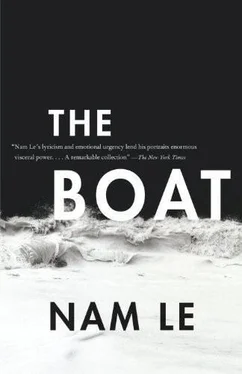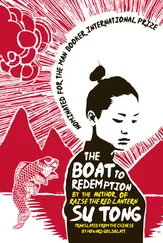To:
Ta Thi Xuan Le, my mother
Le Huu Phuc, my father
and Truong and Victor, my brothers
Importunate along the dark
Horizon of immediacies
The flares of desperation rise.
W. H. AUDEN
How strange that when the summons came I always felt good.
FRANK CONROY
Love and Honor and Pity and Pride and Compassion and Sacrifice
MY FATHER ARRIVED ON A RAINY MORNING. I was dreaming about a poem, the dull thluck thluck of a typewriter's keys punching out the letters. It was a good poem — perhaps the best I'd ever written. When I woke up, he was standing outside my bedroom door, smiling ambiguously. He wore black trousers and a wet, wrinkled parachute jacket that looked like it had just been pulled out of a washing machine. Framed by the bedroom doorway, he appeared even smaller, gaunter, than I remembered. Still groggy with dream, I lifted my face toward the alarm clock.
"What time is it?"
"Hello, Son," he said in Vietnamese. "I knocked for a long time. Then the door just opened."
The fields are glass , I thought. Then tum-ti-ti, a dactyl, end line, then the words excuse and alloy in the line after. Come on , I thought.
"It's raining heavily," he said.
I frowned. The clock read 11:44. "I thought you weren't coming until this afternoon." It felt strange, after all this time, to be speaking Vietnamese again.
"They changed my flight in Los Angeles."
"Why didn't you ring?"
"I tried," he said equably. "No answer."
I twisted over the side of the bed and cracked open the window. The sound of rain filled the room — rain fell on the streets, on the roofs, on the tin shed across the parking lot like the distant detonations of firecrackers. Everything smelled of wet leaves.
"I turn the ringer off when I sleep," I said. "Sorry."
He continued smiling at me, significantly, as if waiting for an announcement.
"I was dreaming."
He used to wake me, when I was young, by standing over me and smacking my cheeks lightly. I hated it — the wetness, the sourness of his hands.
"Come on," he said, picking up a large Adidas duffel and a rolled bundle that looked like a sleeping bag. "A day lived, a sea of knowledge earned." He had a habit of speaking in Vietnamese proverbs. I had long since learned to ignore it.
I threw on a T-shirt and stretched my neck in front of the lone window. Through the rain, the sky was as gray and striated as graphite. The fields are glass … Like a shape in smoke, the poem blurred, then dissolved into this new, cold, strange reality: a windblown, rain-strafed parking lot; a dark room almost entirely taken up by my bed; the small body of my father dripping water onto hardwood floors.
I went to him, my legs goose-pimpled underneath my pajamas. He watched with pleasant indifference as my hand reached for his, shook it, then relieved his other hand of the bags. "You must be exhausted," I said.
He had flown from Sydney, Australia. Thirty-three hours all up — transiting in Auckland, Los Angeles, and Denver — before touching down in Iowa. I hadn't seen him in three years.
"You'll sleep in my room."
"Very fancy," he said, as he led me through my own apartment. "You even have a piano." He gave me an almost rueful smile. "I knew you'd never really quit." Something moved behind his face and I found myself back on a heightened stool with my fingers chasing the metronome, ahead and behind, trying to shut out the tutor's repeated sighing, his heavy brass ruler. I realized I was massaging my knuckles. My father patted the futon in my living room. "I'll sleep here."
"You'll sleep in my room, Ba." I watched him warily as he surveyed our surroundings, messy with books, papers, dirty plates, teacups, clothes — I'd intended to tidy up before going to the airport. "I work in this room anyway, and I work at night."
As he moved into the kitchen, I grabbed the three-quarters-full bottle of Johnnie Walker from the second shelf of my bookcase and stashed it under the desk. I looked around. The desktop was gritty with cigarette ash. I threw some magazines over the roughest spots, then flipped one of them over because its cover bore a picture of Chairman Mao. I quickly gathered up the cigarette packs and sleeping pills and incense burners and dumped them all on a high shelf, behind my Kafka Vintage Classics.
At the kitchen swing door I remembered the photo of Linda beside the printer. Her glamour shot, I called it: hair windswept and eyes squinty, smiling at something out of frame. One of her ex-boyfriends had taken it at LakeMacBride. She looked happy. I snatched it and turned it facedown, covering it with scrap paper.
As I walked into the kitchen I thought, for a moment, that I'd left the fire escape open. I could hear rainwater gushing along gutters, down through the pipes. Then I saw my father at the sink, sleeves rolled up, sponge in hand, washing the month — old crusted mound of dishes. The smell was awful. "Ba," I frowned, "you don't need to do that."
His hands, hard and leathery, moved deftly in the sink.
"Ba," I said, halfheartedly.
"I'm almost finished." He looked up and smiled. "Have you eaten? Do you want me to make some lunch?"
"Thoi," I said, suddenly irritated. "You're exhausted. I'll go out and get us something."
I went back through the living room into my bedroom, picking up clothes and rubbish along the way.
"You don't have to worry about me," he called out. "You just do what you always do."
***
The truth was, he'd come at the worst possible time. I was in my last year at the Iowa Writers' Workshop; it was late November, and my final story for the semester was due in three days. I had a backlog of papers to grade and a heap of fellowship and job applications to draft and submit. It was no wonder I was drinking so much.
I'd told Linda only the previous night that he was coming. We were at her place. Her body was slippery with sweat and hard to hold. Her body smelled of her clothes. She turned me over, my face kissing the bedsheets, and then she was chopping my back with the edges of her hands. Higher. Out a bit more. She had trouble keeping a steady rhythm. "Softer," I told her. Moments later, I started laughing.
"What?"
The sheets were damp beneath my pressed face.
"What?"
" Softer ," I said, "not slower ."
She slapped my back with the meat of her palms, hard — once, twice. I couldn't stop laughing. I squirmed over and caught her by the wrists. Hunched forward, she was blushing and beautiful. Her hair fell over her face; beneath its ash-blond hem all I could see were her open lips. She pressed down, into me, her shoulders kinking the long, lean curve from the back of her neck to the small of her back. "Stop it!" her lips said. She wrested her hands free. Her fingers beneath my waistband, violent, the scratch of her nails down my thighs, knees, ankles. I pointed my foot like a ballet dancer.
Afterward, I told her my father didn't know about her. She said nothing. "We just don't talk about that kind of stuff," I explained. She looked like an actress who looked like my girlfriend. Staring at her face made me tired. I'd begun to feel this way more often around her. "He's only here for three days." Somewhere out of sight, a group of college boys hooted and yelled.
"I thought you didn't talk to him at all."
"He's my father."
"What's he want?"
I rolled toward her, onto my elbow. I tried to remember how much I'd told her about him. We'd been lying on the bed, the wind loud in the room — I remember that — and we were both tipsy. Ours could have been any two voices in the darkness. "It's only three days," I said.
Читать дальше











